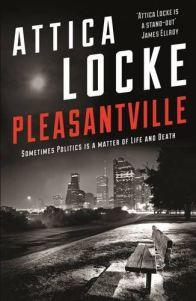 Contemporary politics might not be particularly edifying to live through, but that constant whiff of corruption and bad faith that seems to hang around the corridors of power these days, the pervasive belief, fostered by the media, that politicians will do anything to get their way, makes for some pretty compelling fiction. Attica Locke, whose last novel, The Cutting Season, I loved for its willingness to dig down deep into the issues of race relations (the way Eva Dolan digs relentlessly into issues of immigration) has brought her novelist’s gaze to bear on these two themes, in a story about race and politics set in 1996 that subtly prefigures Obama’s entry into the White House.
Contemporary politics might not be particularly edifying to live through, but that constant whiff of corruption and bad faith that seems to hang around the corridors of power these days, the pervasive belief, fostered by the media, that politicians will do anything to get their way, makes for some pretty compelling fiction. Attica Locke, whose last novel, The Cutting Season, I loved for its willingness to dig down deep into the issues of race relations (the way Eva Dolan digs relentlessly into issues of immigration) has brought her novelist’s gaze to bear on these two themes, in a story about race and politics set in 1996 that subtly prefigures Obama’s entry into the White House.
Houston, Texas, in the final stages of its mayoral race has come down to a run-off between two candidates: Axel Hathorne, an African-American former Chief of Police and Sandy Wolcott, the current states attorney. Crucial to the competition is the district of Pleasantville, a black community founded in the civil rights era that has learned how to consolidate the black vote and can swing a closely run poll. On paper it looks as if Axel ought to be way out in front, but when a young woman goes missing, last seen wearing the blue t-shirt of his campaign volunteers, public opinion starts to shift against him. And then when his campaign manager and nephew, Neal, is charged with her murder, the timing is so bad and the evidence so weak that the most outrageous smear by the other side is suspected. But is it political suicide to say so?
More or less coerced into helping the Hathorne family is Jay Porter, the small town lawyer who featured in Attica Locke’s first novel, Black Water Rising (which I haven’t read and it didn’t seem to matter). Jay is unwilling to take on the case; he is still coming to terms with the recent death of his wife and his difficulties in parenting their two teenage children, Ellie and Ben. For a year he has been treading water and can scarcely bear the thought of entering a courtroom again. Plus, he has more than enough work to deal with, as he is still chasing the money promised his clients by Cole Oil, a petrochemical firm whose thoughtless practices were causing dangerous pollution. The $56 million that the firm is still finding ways to avoid paying out is causing his clients to lose faith in him and to seek other lawyers. It’s this issue which the Hathorne family’s patriarch, Sam, manages to hold against him until he agrees to help with the murder case.
What I especially like about Attica Locke’s novels is how real they are. Pleasantville actually exists, a community based on political activism who ‘endured the worst of Jim Crow, backs of buses and separate toilets; and yes, they paid their taxes, driving or walking for miles each Election Day, waiting in lines two and three hours long. Yes, they waited. But they also marched… holding out the collective votes of a brand-new bloc as a bargaining chip to politicians previously reluctant to consider the needs of the new Negro middle class’. And Jay Porter is such a plausible protagonist. When we first meet him, he is waiting for the police outside his broken-into offices, strenuously avoiding any act of derring-do. ‘There was nothing in that office that he couldn’t live without, not a thing in the world he would put before the need to get back home to his family in one piece. He wasn’t trying to be a hero.’ Some have heroics thrust upon them, however, and inevitably as the mayoral fight gets dirtier and the investigation into the murder comes closer to its perpetrators, it’s Jay’s family that gets put on the line.
This is a twisty, complex legal thriller, reminiscent in some ways of John Grisham, but a great deal more serious and literary. It’s crime fiction for grown-ups, if you like, the sort of novel that is definitely going to inform and enlighten you while it takes you on a tense quest for a killer. Occasionally, I thought Locke risked burying her action with her beautiful prose, but she is such a talented writer the story manages to be compelling throughout. I was also glad to have been educated by The Good Wife about American politics, as I felt I got more from the book because I knew something about state’s attorneys and campaign managers and the general atmosphere in which politics is conducted. But that being said, you could pick this book up in all ignorance and still enjoy it. At the end of the day, there’s a murderer to catch and a two-person race for a high ranking job between teams of politicos whose ambition risks outweighing their ethics. When you get to the final section of the novel, set in the courtroom, there’s a terrific momentum carrying the reader along. Attica Locke is definitely a subtle, clever and insightful writer to watch.
